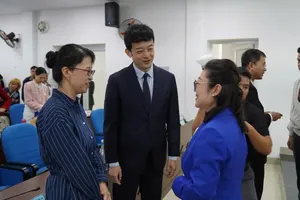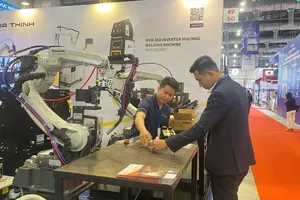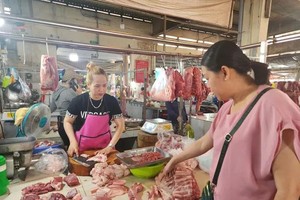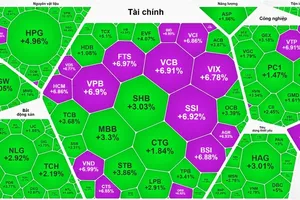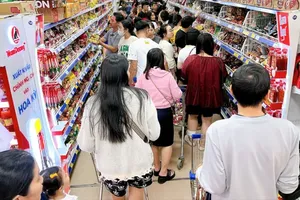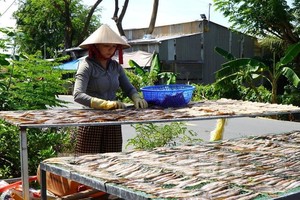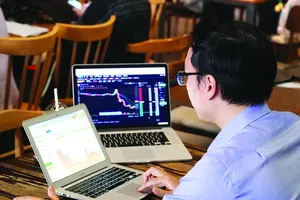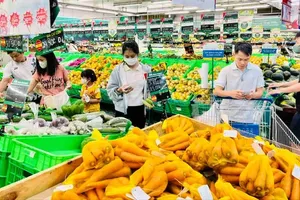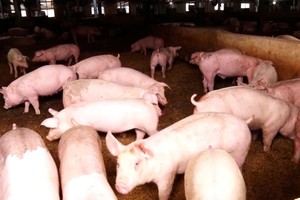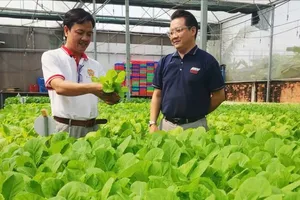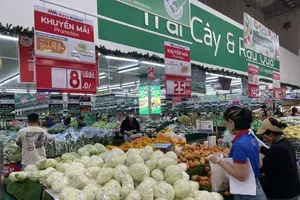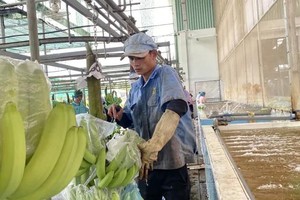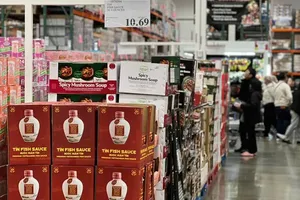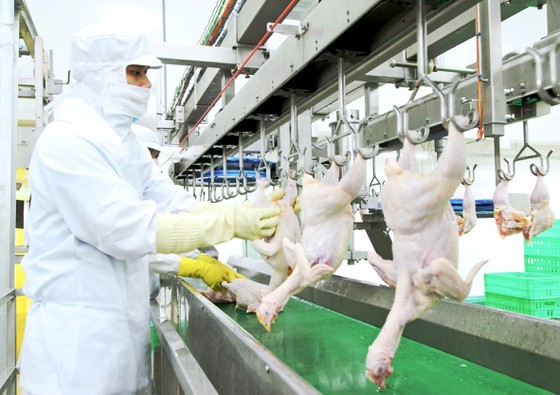
Mr. Nguyen Van Minh, a farmer in Cay Gao Commune in Trang Bom District in Dong Nai Province, wailed that his family invested in large-scale chicken raising this year. Up to now, the costs for feed, epidemic prevention, and chicken coop reached around VND500 million. He expected that the market would be stable. Unfortunately, the price of chicken dropped drastically, causing his family to lose nearly VND300 million.
Sharing the same situation, Mr. Vu Khach Vinh, a farmer in Hung Loc Commune in Thong Nhat District in Dong Nai Province, said that he has been raising chickens for ten years but the price of chickens has never been as unstable as this year. A few days ago, his family sold 4,000 chicken, collecting VND200 million while the cost for chicken raising was VND300 million.
As schools have been closed for a long time, collective kitchens halted operations, causing the prices of chicken and pork to plummet heavily. The price of chickens with weight at 2.5 kilograms per chicken fell from VND25,000 per kilogram to VND12,000 per kilogram. Meanwhile, the price of chickens with weight at nearly 4 kilograms per chicken merely touched VND10,000 per kilogram. A drop of 50 percent in the price of chickens has caused farmers to suffer a loss of about VND10,000 per kilogram. However, at traditional markets, the price of chickens remained at a fairly high level of VND50,000 per kilogram.
The epidemic of an acute respiratory illness caused by the Covid-19 also messed up the price level of vegetables and fruits. Last year, Vietnam imported worth of US$450 million of vegetables and fruits from China. In recent days, as the supply of vegetables and fruits imported from China was temporarily halted so the market has shown signs of a shortage of some types of vegetables and fruits.
Ms. Nguyen Thi Anh Tuyet, Deputy Director of Anh Dao Agricultural Service Cooperative in Lam Dong Province, said that her cooperative could not collect enough goods to fulfill its contracts. Increasing purchasing power has driven the prices of leafy greens, root vegetables, and fruits up. Especially, as the supply of vegetables imported from China was paused, traders flocked to fields of the cooperative’s members to buy vegetables at higher prices, urging many farmers to break the contract with the cooperative. Products that boost the resistance, including ginger, lime, and lemongrass were purchased heavily, causing a hike in their prices and a shortage of supply, making it difficult for the cooperative to fulfill their contracts.
Amid the context that the price of chickens has been declining in Dong Nai Province, the chicken farm of Mr. Nguyen Minh Kha is still able to sell chickens at a stable price of VND25,000 per kilogram because he joined the value chain with a company that exports chickens to Japan, providing chickens under stable contracts. Every time the market changes, the value chain model again shows that it is the safest model for farmers.
Sharing the same situation, Mr. Vu Khach Vinh, a farmer in Hung Loc Commune in Thong Nhat District in Dong Nai Province, said that he has been raising chickens for ten years but the price of chickens has never been as unstable as this year. A few days ago, his family sold 4,000 chicken, collecting VND200 million while the cost for chicken raising was VND300 million.
As schools have been closed for a long time, collective kitchens halted operations, causing the prices of chicken and pork to plummet heavily. The price of chickens with weight at 2.5 kilograms per chicken fell from VND25,000 per kilogram to VND12,000 per kilogram. Meanwhile, the price of chickens with weight at nearly 4 kilograms per chicken merely touched VND10,000 per kilogram. A drop of 50 percent in the price of chickens has caused farmers to suffer a loss of about VND10,000 per kilogram. However, at traditional markets, the price of chickens remained at a fairly high level of VND50,000 per kilogram.
The epidemic of an acute respiratory illness caused by the Covid-19 also messed up the price level of vegetables and fruits. Last year, Vietnam imported worth of US$450 million of vegetables and fruits from China. In recent days, as the supply of vegetables and fruits imported from China was temporarily halted so the market has shown signs of a shortage of some types of vegetables and fruits.
Ms. Nguyen Thi Anh Tuyet, Deputy Director of Anh Dao Agricultural Service Cooperative in Lam Dong Province, said that her cooperative could not collect enough goods to fulfill its contracts. Increasing purchasing power has driven the prices of leafy greens, root vegetables, and fruits up. Especially, as the supply of vegetables imported from China was paused, traders flocked to fields of the cooperative’s members to buy vegetables at higher prices, urging many farmers to break the contract with the cooperative. Products that boost the resistance, including ginger, lime, and lemongrass were purchased heavily, causing a hike in their prices and a shortage of supply, making it difficult for the cooperative to fulfill their contracts.
Amid the context that the price of chickens has been declining in Dong Nai Province, the chicken farm of Mr. Nguyen Minh Kha is still able to sell chickens at a stable price of VND25,000 per kilogram because he joined the value chain with a company that exports chickens to Japan, providing chickens under stable contracts. Every time the market changes, the value chain model again shows that it is the safest model for farmers.
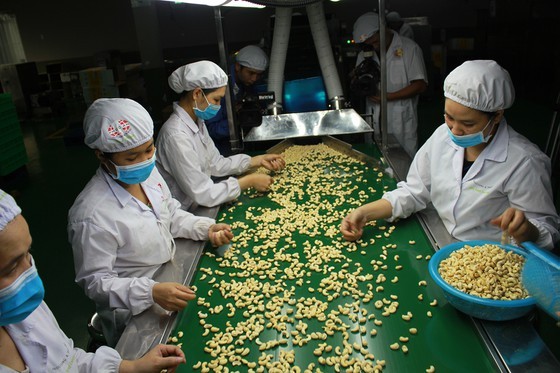 The cashew industry still has export orders to China despite the outbreak of the Covid-19. (Photo: SGGP)
The cashew industry still has export orders to China despite the outbreak of the Covid-19. (Photo: SGGP)
According to the Vietnam Cashew Association, at this time, the cashew industry still has official export orders to China, as goods are transported by sea so exporting is not affected as much as transporting by land. Export orders remain stable for enterprises that choose official export, meeting requirements of traceability, label and packing under international standards.
Sharing the same opinion, Mr. Luong Van Tu, Chairman of the Vietnam Coffee - Cocoa Association, said that products must be produced following safety standards to meet the requirements of the global market, avoiding putting all eggs into one basket. It is important to focus on developing the value chain. Enterprises survey export markets to meet the requirements of importers, then collaborate with farmers to change farming methods.
Amid the situation that many enterprises were canceled contracts by farmers, Mr. Vo Quan Huy, Director of Huy Long An Company, which specializes in exporting bananas to many countries, including China, shared that besides signing contracts, enterprises need to invest money to cooperate with farmers following the profit-sharing ratio. Because of the cooperation agreement, farmers receive investment capital from enterprises so they cannot sell their produce to other places on their own for fear that they will be punished by the law. If there are epidemics and natural disasters, enterprises will share the risk with farmers.
Similarly, Mr. Nguyen Lam Vien, Chairman of Vinamit Company, said that thanks to the setting up of the value chain, although there is a scarcity of vegetables and root vegetables, his company is still able to provide enough goods for its partners at stable prices according to previously signed contracts.
‘After the outbreak of the Covid-19, I hope that many farmers will realize the benefits of the value chain. On this opportunity, Vietnam’s agricultural sector carries out restructuring, setting out plans and solutions to develop stable production and not to depend too much on any market,’ said Mr. Nguyen Lam Vien.
Sharing the same opinion, Mr. Luong Van Tu, Chairman of the Vietnam Coffee - Cocoa Association, said that products must be produced following safety standards to meet the requirements of the global market, avoiding putting all eggs into one basket. It is important to focus on developing the value chain. Enterprises survey export markets to meet the requirements of importers, then collaborate with farmers to change farming methods.
Amid the situation that many enterprises were canceled contracts by farmers, Mr. Vo Quan Huy, Director of Huy Long An Company, which specializes in exporting bananas to many countries, including China, shared that besides signing contracts, enterprises need to invest money to cooperate with farmers following the profit-sharing ratio. Because of the cooperation agreement, farmers receive investment capital from enterprises so they cannot sell their produce to other places on their own for fear that they will be punished by the law. If there are epidemics and natural disasters, enterprises will share the risk with farmers.
Similarly, Mr. Nguyen Lam Vien, Chairman of Vinamit Company, said that thanks to the setting up of the value chain, although there is a scarcity of vegetables and root vegetables, his company is still able to provide enough goods for its partners at stable prices according to previously signed contracts.
‘After the outbreak of the Covid-19, I hope that many farmers will realize the benefits of the value chain. On this opportunity, Vietnam’s agricultural sector carries out restructuring, setting out plans and solutions to develop stable production and not to depend too much on any market,’ said Mr. Nguyen Lam Vien.
